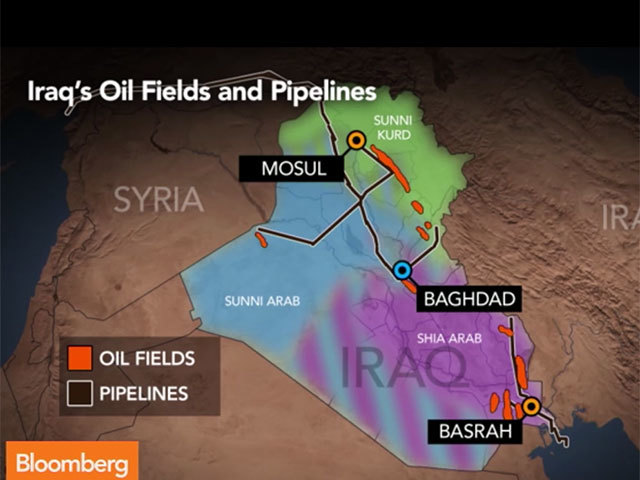
Kurdish fighters have taken over two oil fields outside the disputed city of Kirkuk, Iraq’s Oil Ministry says.
The Kurdish forces known as peshmerga seized the Bai Hassan and Kirkuk oil fields before dawn today, said spokesman Assem Jihad, who added that the move was “a violation to the constitution … and a threat to national unity”.
There was no immediate comment from authorities in the Kurdish self-rule region of northern Iraq.
The already difficult relationship between the Kurds and Iraq’s central government has deteriorated in recent days.
On Wednesday, prime minister Nouri al-Maliki accused the Kurds of harbouring the Sunni militants who have overrun much of the country. The Kurds responded by vowing to boycott cabinet meetings and renewing demands that Mr al-Maliki step down.
The seizure of the fields could accelerate the unravelling of already worsening relations between the Kurdish autonomy zone in the north and Iraq’s central government.
The spat is one of the ripple effects of the Sunni militant offensive that overran much of northern and western Iraq last month, plunging the country into its worst crisis since the last U.S. troops left in 2011.
The two sides have squabbled for years over a host of issues, chief among them oil rights and land disputes, and yet they have also found room for compromise, and the Kurds have provided critical backing to help Mr al-Maliki become prime minister.
But the Sunni militant blitz led by the Islamic State of Iraq and the Levant extremist group has effectively cleaved the country along ethnic and sectarian lines – the swath of militant-held Sunni areas, the Shiite-majority south and centre ruled by the Shiite-led government in Baghdad, and the Kurdish north. In the process, the Kurds appear increasingly ready to go it alone.
The Kurds, who have long agitated for a state of their own, have pushed into disputed territory, including the oil-rich area of Kirkuk. They say the move aims to protect civilians from the militant onslaught, but the lands they have entered have considerable Kurdish populations, making it unlikely the Kurds would be willing to relinquish them.
The president of the Kurdish area has urged regional law makers to pave the way for a referendum on independence – something Baghdad and the US oppose.
At the same time in Baghdad, national politicians are struggling to broker an agreement on a new prime minister, president and speaker of parliament after April elections.
The legislature is scheduled to meet on Sunday for its second session amid calls for the quick formation of a new government that can confront the militants and hold the country together.
Mr al-Maliki, whose State of Law bloc won the most seats in the elections, has shrugged off calls to step aside, vowing to pursue a third consecutive term. His opponents – and many former allies – want him removed, accusing him of monopolising power during his eight years in office and contributing to the current crisis by failing to promote reconciliation with Sunnis.
The United States and other world powers, as well as Iraq’s top Shiite cleric, have pressed for a more inclusive government that Iraqis of all stripes can rally around.
Today ayatollah Ali al-Sistani again urged law makers to move swiftly toward a compromise, calling on them to “rise above selfish aims” and to “speed up the election of the three leadership positions and the formation of a new government accepted by wide national approval to lay the radical solutions to the country’s accumulated problems and crises”.